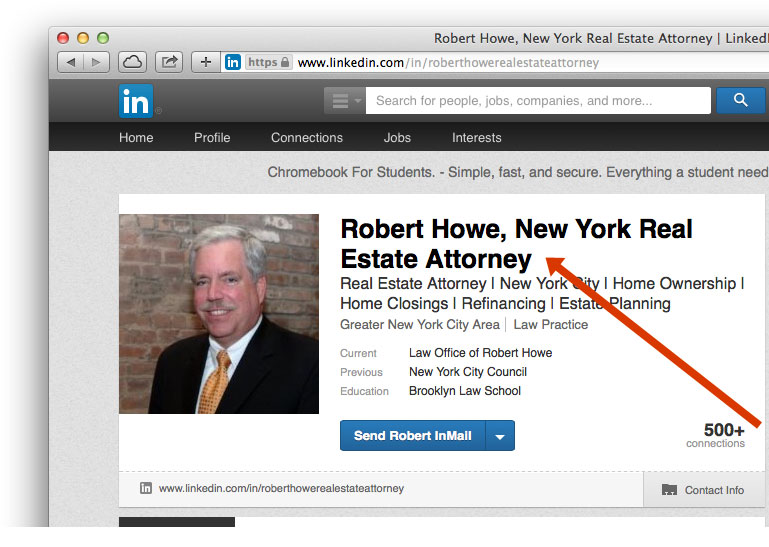LinkedIn is quickly becoming a source of referrals and client acquisition for lawyers. However, as a lawyer, the rules of the game are a little different. Here are a few things to consider:
Headline

Marketing Tip (and to keep you our of hot water).
Many lawyers put “Partner of XYZ Law Firm” in their headline. However, the best approach is to put your practice area and geographic location in your headline “i.e. Bankruptcy Attorney Pasadena California.” By using this approach, both consumers and businesses will be able to find you on LinkedIn and on Google when they search for a lawyer versed in a particular practice area in a specific geographic location. 9 out of 10 executives use LinkedIn and many general counsel have admitted to searching for outside counsel on LinkedIn. You want to make it easy for them to find you on LinkedIn.
Ethical Considerations
Many states, including California, have ruled that online profiles are governed by the Rules of Professional Conduct and can also be interpreted as advertisements depending on their content. (California Ethics Opinion 2012-186, PDF). Below are few things to look out for when creating or editing your Linkedin profile.
- Identify your state of jurisdiction in your profile: This protects you from unauthorized practice of law by identifying which state you are licensed to practice in.
- Add disclaimer language: Add the following disclaimers to your Summary Section. Please review your state’s Rules of Professional Conduct for the particular language required in your state.
- “DISCLAIMER: This material may be considered attorney advertising under certain rules of professional attorney conduct.”
- “DISCLAIMER: Any endorsement or testimonial does not constitute a guarantee, warranty, or prediction on the outcome of your legal matter.”
- “DISCLAIMER: No attorney-client relationship is created when you contact me. Please do not include any confidential information in your communications. I encourage you to visit my website {www.lawfirm.com} or call me at (phone number) for a free consultation of your case.”
- Specialist status: In most states, including California, a lawyer can not hold himself out to be a specialist without being state certified as such. Therefore, do not list any of your practice areas under a section labeled specialties.
Endorsement section
This section is a double edged sword. On one hand, endorsements from previous clients or attorneys you have worked with can positively impact your reputation, on the other, misleading statements or false statements can place you in a sticky situation. Negative commentary and reviews also can have unpleasant effects on your status as an experienced and reputable attorney.
For these reasons, some attorneys prefer to eliminate the endorsement section in its entirety. You can do this by editing your profile, scrolling down to the Skills & Endorsements section, clicking edit, and selecting “No” next to “I want to be endorsed.” Although I don’t feel like this is the best approach, I also don’t want you to ever feel uncomfortable. I recommend taking a proactive approach and monitoring this section of your profile every closely. You should remove any endorsement from anyone that claims to have worked with you but hasn’t. You should also remove any endorsement that is misleading or conveys a false statement. As the attorney, you are responsible for monitoring your endorsements section to make all the information, whether posted by you or a third party, complies with the ethics rules.
Inviting people to connect
You should only invite business contacts that you went to law school with, that you met at a networking event or that you have done business with. Be careful when inviting others to become a connection if they are current or past clients. Usually it is best practice to not send invites to clients but instead only allow current clients or past clients to connect with you if they want. You must also refrain from inviting those you know are represented by counsel to connect on LinkedIn, without getting the counsel’s consent.
When sending an invitation to connect, you have the ability to write a personalized note. You should never offer to provide your legal services in a message accompanying your invitation as this may be interpreted as a solicitation.
Accepting invitations to connect
While it is true that the more contacts you have, the better, you only want to connect with people you actually know. When someone invites me to be their contact, I will usually deny the request if I do not know them or I will ask them how they know me in a LinkedIn message. This prompt usually leads to a conversation and I will then evaluate whether or not I want to connect with that person. To me, having a quality list of connections that I have either met, shook hands with, did business with or went to school with, is way more important than the number of contacts I have.
Sources:
http://blog.ceb.com/2014/04/30/could-your-linkedin-profile-lead-to-an-ethics-violation/
http://www.americanbar.org/publications/blt/2014/01/03_harvey.html
All opinions, advice, and experiences of guest bloggers/columnists are those of the author and do not necessarily reflect the opinions, practices or experiences of Solo Practice University®.





















Great tips, thank you!